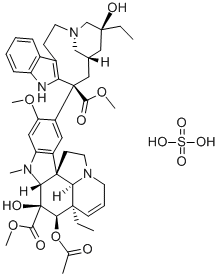About Vinblastine sulfate
Uses
Vinblastine is used to treat cancer. It works by slowing or stopping the growth of cancer cells.
How to use Vinblastine SULFATE Vial
This medication is given by injection into a vein by a health care professional. It is usually given once a week or as directed by your doctor. To prevent leakage of the medication into tissue around the vein, vinblastine should be injected over 1 minute. Tell your health care professional right away if you experience pain, burning, or redness at the injection site. This medication should not be mixed in a large amount of solution and/or injected over a long time (such as 30 to 60 minutes) unless directed by your doctor. Doing so may increase the risk of leakage. If the medication starts to leak into tissue, the injection should be stopped and the remaining solution should be given into a different vein.
The dosage is based on your medical condition, body size, and response to treatment. Your doctor will do blood tests (complete blood count) to find the right dose for you. Your next dose may need to be rescheduled if your white blood cell count is too low.
Avoid getting this medication in your eye. If this occurs, wash the affected eye(s) well and contact your doctor.
Unless your doctor instructs you otherwise, drink plenty of fluids while taking this medication. Doing so helps your kidneys to remove the drug from your body and avoid some of the side effects.
Side Effects
Pain/redness at the injection site, nausea, vomiting, constipation, tiredness, and loss of appetite may occur. Nausea and vomiting can be severe. In some cases, your doctor may prescribe medication to prevent or relieve nausea and vomiting. Eating several small meals, not eating before treatment, or limiting activity may help lessen some of these effects. If these effects persist or worsen, tell your doctor or pharmacist promptly.
To prevent constipation, eat dietary fiber, drink enough water, and exercise. You may also need to take a laxative. Ask your pharmacist which type of laxative is right for you.
Temporary hair loss is another common side effect. Normal hair growth should return after treatment has ended.
Many people using this medication may have serious side effects. However, your doctor has prescribed this medication because he or she has judged that the benefit to you is greater than the risk of side effects. Careful monitoring by your doctor may decrease your risk.
Painful sores on the lips, mouth, and throat may occur. To decrease the risk, limit hot foods and drinks, brush your teeth carefully, avoid using mouthwash that contains alcohol, and rinse your mouth frequently with cool water.
Tell your doctor right away if you have any serious side effects, including: easy bleeding/bruising, fast/pounding heartbeat, abdominal/stomach pain, bone/jaw pain, severe headache, hearing problems, unusual lumps/skin changes, dizziness/feeling of spinning, mental/mood changes (e.g., depression), pale/bluish fingers/toes, pain/coldness in fingers/toes, numbness/tingling, difficult/painful urination, pink/bloody urine.
Get medical help right away if any of these rare but very serious side effects occur: sudden shortness of breath/wheezing, black/tarry stools, chest/left arm pain, confusion, seizures, slurred speech, weakness on one side of the body, vision changes, vomit that looks like coffee grounds.
This medication can lower the body's ability to fight an infection. Tell your doctor promptly if you develop any signs of an infection such as fever, chills, or persistent sore throat.
A very serious allergic reaction to this drug is rare. However, get medical help right away if you notice any symptoms of a serious allergic reaction, including: rash, itching/swelling (especially of the face/tongue/throat), severe dizziness, trouble breathing.
This is not a complete list of possible side effects. If you notice other effects not listed above, contact your doctor or pharmacist.
Interactions
Drug interactions may change how your medications work or increase your risk for serious side effects. This document does not contain all possible drug interactions. Keep a list of all the products you use (including prescription/nonprescription drugs and herbal products) and share it with your doctor and pharmacist. Do not start, stop, or change the dosage of any medicines without your doctor's approval.
Some products that may interact with this drug include: aspirin and other NSAIDs (such as ibuprofen), hydantoins (such as phenytoin), tolterodine, drugs that may harm the ears (for example, cisplatin, carboplatin, aminoglycosides such as gentamicin).
Other medications can affect the removal of vinblastine from your body, which may affect how vinblastine works. Examples include azole antifungals (such as itraconazole, voriconazole), macrolide antibiotics (such as erythromycin), rifamycins (such as rifabutin), among others.
Check all prescription and nonprescription medicine labels carefully since many contain pain relievers/fever reducers (NSAIDs such as ibuprofen, naproxen, or aspirin) that may increase your risk of bleeding. Low-dose aspirin should be continued if prescribed by your doctor for heart attack or stroke prevention (usually at dosages of 81-325 milligrams a day). Consult your doctor or pharmacist for more details.
Your doctor may direct you to limit citrus (and other foods/products that increase the acid level of urine) during treatment. Consult your doctor.
See also
Lastest Price from Vinblastine sulfate manufacturers

US $5.00-0.50/KG2025-05-29
- CAS:
- 143-67-9
- Min. Order:
- 1KG
- Purity:
- 99% hplc
- Supply Ability:
- 500TONS

US $5.00-0.50/KG2025-05-08
- CAS:
- 143-67-9
- Min. Order:
- 1KG
- Purity:
- 99% hplc
- Supply Ability:
- 500TONS
